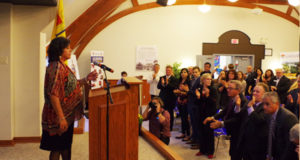Cynthia Wesley-Esquimaux: helping lead the way in Indigenous education

By Rick Garrick
THUNDER BAY—Cynthia Wesley-Esquimaux, a member of Chippewas of Georgina Island First Nation, has been busy since being introduced as Lakehead University’s First Chair on truth and reconciliation on September 16, 2016.
“It’s only been a couple of days, but I have had an extensive meeting with [Lakehead University President and Vice-Chancellor Brian Stevenson] about the tasks that will be associated with the position,” Wesley-Esquimaux says. “We want to be able to obviously lift the profile of Lakehead, we want to be able to talk about the kind of education that we offer, the kind of relationship we have with the Indigenous community. There are a lot of things that are really important parts of this.”
Wesley-Esquimaux also received a call about holding a conversation about reconciliation in Thunder Bay.
“People are already interested in generating conversations around reconciliation in Thunder Bay,” Wesley-Esquimaux stated. “…Also, I had a conversation with CBC this morning…with Ontario Today. And I had an extensive conversation yesterday with the University of Saskatchewan about what it could mean and…how a position like this can assist with the universities actually making Indigenous content requirement work.”
Lakehead University incorporated an Indigenous content requirement this year where every student completes a minimum of 18 hours of Indigenous instruction throughout their studies in order to graduate.
“The appointment of our first chair on truth and reconciliation comes at the same time that Lakehead students from around the world are starting their undergraduate programs that incorporate our unique Indigenous content requirement,” Stevenson says. “These efforts show that Lakehead University is leading the way when it comes to educating students about Aboriginal issues and Canada’s past, and we will continue to lead the way with advocacy and assistance from Dr. Wesley-Esquimaux.”
Wesley-Esquimaux’s role also includes advocating for truth and reconciliation within the Lakehead University community, while also serving as an ambassador for truth and reconciliation issues in northwestern Ontario and Simcoe County and at the provincial and national levels.
“This is an incredibly important time in history and this appointment is an important statement by Lakehead about its commitment to moving forward on the process of reconciliation in our region and country,” Wesley-Esquimaux says. “I am humbled and honoured to have been selected for this role.”
Wesley-Esquimaux previously served as Lakehead University’s vice provost (Aboriginal Initiatives) since 2013. She was also inducted as an Honourary Witness by the Truth and Reconciliation Commission of Canada in 2015.
“This is an educational exercise, obviously, but it is also an exercise that engages the entire population of cities like Thunder Bay and Winnipeg and Saskatoon,” Wesley-Esquimaux says. “If every city or every academic institution takes a piece of this, we will be able to make quite a dent in the conversation because where do young people go—hopefully they go to school. And this conversation of reconciliation and Indigenous content and respect means it’s that much safer for Indigenous people to go through the door of academia.”
Wesley-Esquimaux’s introduction to her new role was attended by many leaders, including Carolyn Bennett, Minister of Indigenous and Northern Affairs Canada; David Zimmer, Minister of Indigenous Relations and Reconciliation; Michael Gravelle, Minister of Northern Development and Mines; Bill Mauro, Minister of Natural Resources and Forestry; Regional Chief of Ontario Isadore Day; Nishnawbe Aski Nation Grand Chief Alvin Fiddler; Fort William Chief Peter Collins; and Charlie Angus, Timmins-James Bay MP.
Wesley-Esquimaux has been looking at the request Day made for a meeting with Bennett and Zimmer during her introduction.
“We will choose a mutual time frame, maybe it will be next spring or long enough into the future so that people can get organized around it,” Wesley-Esquimaux says. “In the interim, we want to have some other meetings to confirm what are we coming to the table for.”


